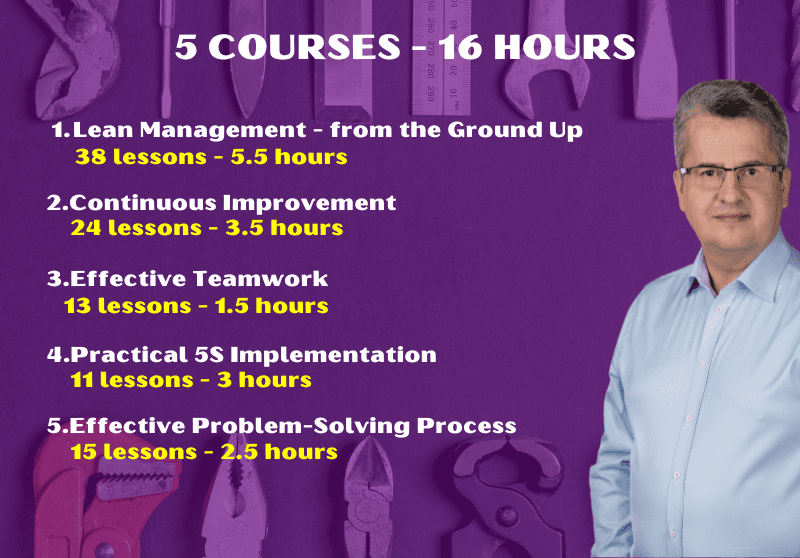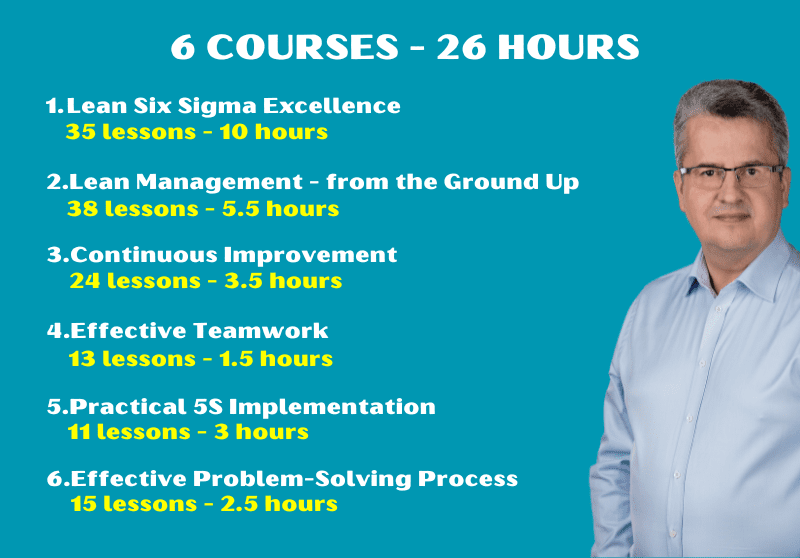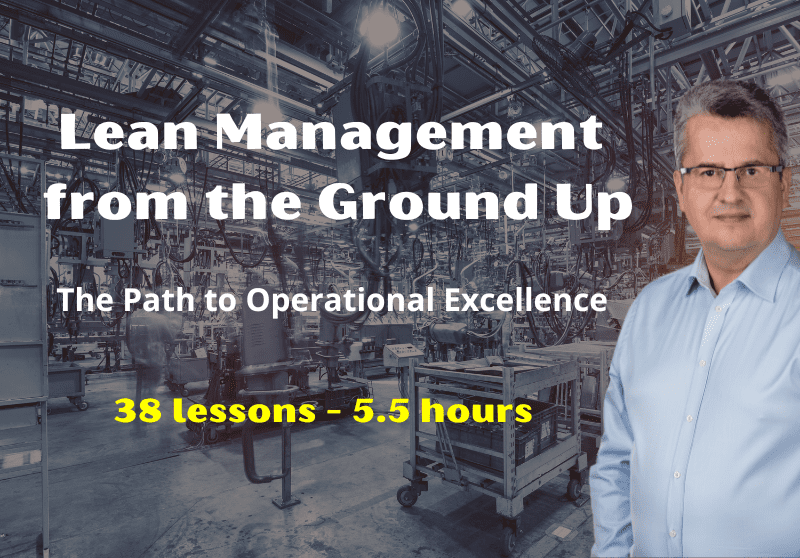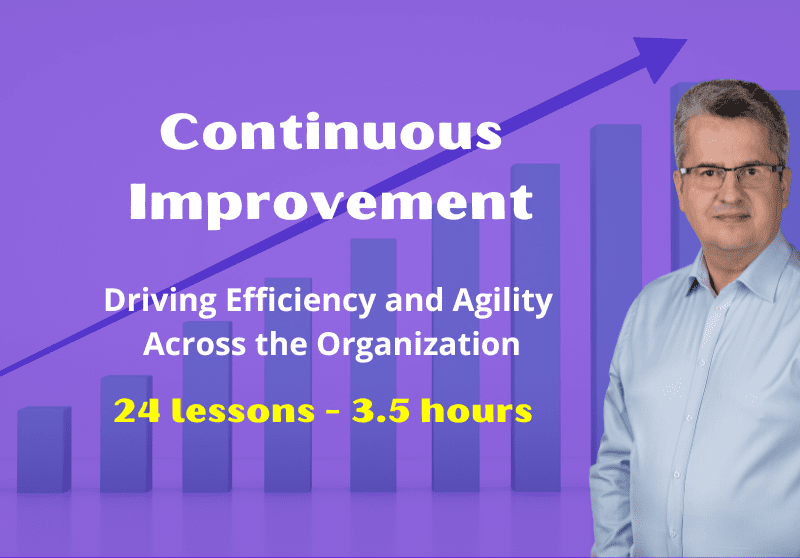About course
- Certified teamwork training
- 1.5 hours of video content
- Lifetime access
- One-time payment
- Train your whole team
- Watch anytime, on any device
- Includes PDF tools and templates
- Certificate of completion
- VAT invoice included
- Created by Lean expert with 25+ years of experience
- Strengthen collaboration and team efficiency
- One payment – get 5 courses at a special price
- Free with Get Lean game
About the course
The "Effective Teamwork – The Foundation of a Lean Approach to Process Optimization" course is an engaging and practical program designed to empower leaders with the tools to build, develop, and sustain high-performing teams. From understanding the core differences between teams and groups to mastering the art of leadership in dynamic environments, this course is your guide to achieving teamwork excellence.
Participants will explore the stages of team development—forming, storming, norming, and performing—learning how to manage the unique challenges and opportunities at each phase. You will gain insights into fostering trust, collaboration, and accountability to create a cohesive, goal-oriented team.
This course emphasizes essential team-building skills, including assertiveness, effective communication, and conflict resolution. You'll learn proven strategies for managing disagreements constructively and adopting consensus decision-making for collaborative solutions. Role assignment, goal setting, and progress monitoring are other key areas, ensuring every team member's strengths are optimized for success.
Special attention is given to leading remote teams, organizing productive meetings, and maintaining motivation to sustain long-term performance. By the end of the program, you'll have the knowledge and confidence to lead any team—remote or in-person—toward achieving their highest potential.
Ideal for team leaders, project managers, and HR professionals, this course ensures you're prepared to build collaborative, accountable, and high-achieving teams in today's fast-paced work environments.
For everyone who purchases the Get Lean game, enrollment in this course is free.
Why You Should Enroll in This Course:
- Distinguish teams from working groups.
- Navigate team development stages.
- Build assertive and effective communication.
- Resolve conflicts with proven methods.
- Foster trust and team collaboration.
- Assign roles based on team strengths.
- Organize productive and focused meetings.
- Motivate and sustain team performance.
- Set and achieve SMART goals.
- Drive continuous improvement in teams.
- Pay once and enjoy lifetime access
Table of content
Unlock Your Team’s Full Potential: The Certified Effective Teamwork Course
In today’s dynamic work environment, high-performing teams are the bedrock of success. Our “Effective Teamwork – The Foundation of a Lean Approach to Process Optimization” certified course is meticulously designed to equip leaders, project managers, and HR professionals with the practical strategies and insights needed to build, develop, and sustain truly cohesive and productive teams, whether in-person or remote. Move beyond mere groups and cultivate a culture of excellence, collaboration, and continuous improvement.
Why This Course is Essential for Modern Leaders:
- ✅
Master Team Dynamics: Understand the crucial differences between groups and high-performing teams, and navigate each stage of team development (forming, storming, norming, performing) with confidence. - ✅
Enhance Communication & Conflict Resolution: Develop assertiveness, foster open communication, and learn proven strategies to resolve disagreements constructively, leading to stronger team cohesion. - ✅
Optimize Team Performance: Gain insights into fostering trust, collaboration, and accountability. Learn to assign roles effectively, set SMART goals, and monitor progress to maximize collective strengths. - ✅
Lead Remote & Hybrid Teams: Acquire specialized techniques for organizing productive virtual meetings and maintaining motivation across distributed team members, ensuring sustained high performance. - ✅
Certified & Lifetime Access: Earn a valuable certification and enjoy permanent access to course materials, allowing you to revisit concepts and refine your skills whenever needed.
Who Will Benefit From This Course?
- ➡️ Team Leaders & Supervisors seeking to elevate their team’s performance and cohesion.
- ➡️ Project Managers aiming to optimize project delivery through effective team collaboration.
- ➡️ HR Professionals focused on developing organizational talent and fostering a positive work environment.
- ➡️ Anyone aspiring to strengthen their leadership skills and build more effective working relationships.
Course At A Glance:
| Course Title | Effective Teamwork – The Foundation of a Lean Approach to Process Optimization |
|---|---|
| Format | Online, Self-Paced Program |
| Certification | Yes, Certified Course |
| Access | Lifetime Access |
| Target Audience | Team Leaders, Project Managers, HR Professionals |
Our 30-Day Total Confidence Guarantee!
Your learning and leadership growth are our top priorities. If you’re not 100% satisfied with the insights and tools gained from the “Effective Teamwork” course within 30 days of enrollment, simply let us know. We’ll provide a full, no-hassle refund.
Frequently Asked Questions
+
Is this course suitable for leading remote teams?
Absolutely! The course includes a dedicated section on leading remote teams, covering strategies for productive virtual meetings, maintaining motivation, and fostering collaboration across distributed team members. It’s designed to equip you for both in-person and remote leadership challenges.
+
What does “lifetime access” mean?
Lifetime access means that once you enroll in the course, you’ll have unlimited, permanent access to all course materials, including any future updates or additions. There are no recurring fees or time limits, allowing you to learn at your own pace and revisit content whenever you need a refresher.
+
Is this course truly certified?
Yes, upon successful completion of the “Effective Teamwork” course, you will receive an official certification, validating your enhanced skills in team leadership and process optimization. This certification can be a valuable addition to your professional profile.
+
Will this course help me improve team communication and conflict resolution?
Absolutely. A significant portion of the course is dedicated to essential team-building skills, including assertiveness, effective communication strategies, and proven methods for constructive conflict resolution. You’ll gain practical tools to foster open dialogue and manage disagreements productively.






Sudheer Divyakolu (verified owner) –
The lessons on aligning team goals, providing constructive feedback, and fostering innovation were particularly impactful. I also appreciated the hands-on exercises that encouraged immediate application of the concepts.
Rachel Vaidya (verified owner) –
Each module was structured clearly, and the lessons were interactive, keeping me fully engaged throughout.
Niyati Shenoy (verified owner) –
Develop effective team-building skills to foster collaboration, trust, and communication. This course equips leaders and managers to create high-performing teams and cultivate a positive workplace culture. I like this course very much.
Tilla Pfeiffer (verified owner) –
Useful advice, doable suggestions, and real-world examples. Every leader needs it!
JessyK –
This training highlighted the role of communication in Lean. It showed me that process tools alone are not enough
CoachOps –
Great insights into how teamwork drives Lean success
Peter Brown –
The instructor’s style was encouraging and professional. It felt like real coaching, not just slides. My team responded positively to the methods.
Kasia Mech –
The training combined leadership, communication, and Lean. It gave me a new toolkit for managing teams. The examples were practical, not abstract. I highly recommend it